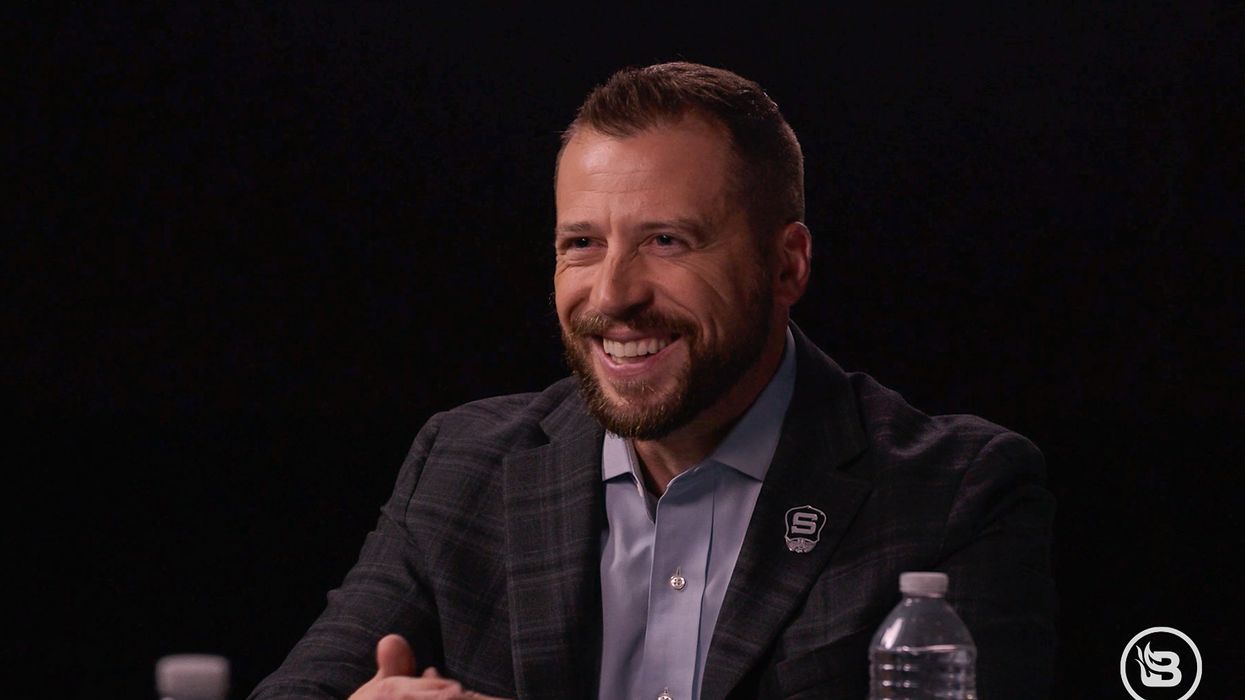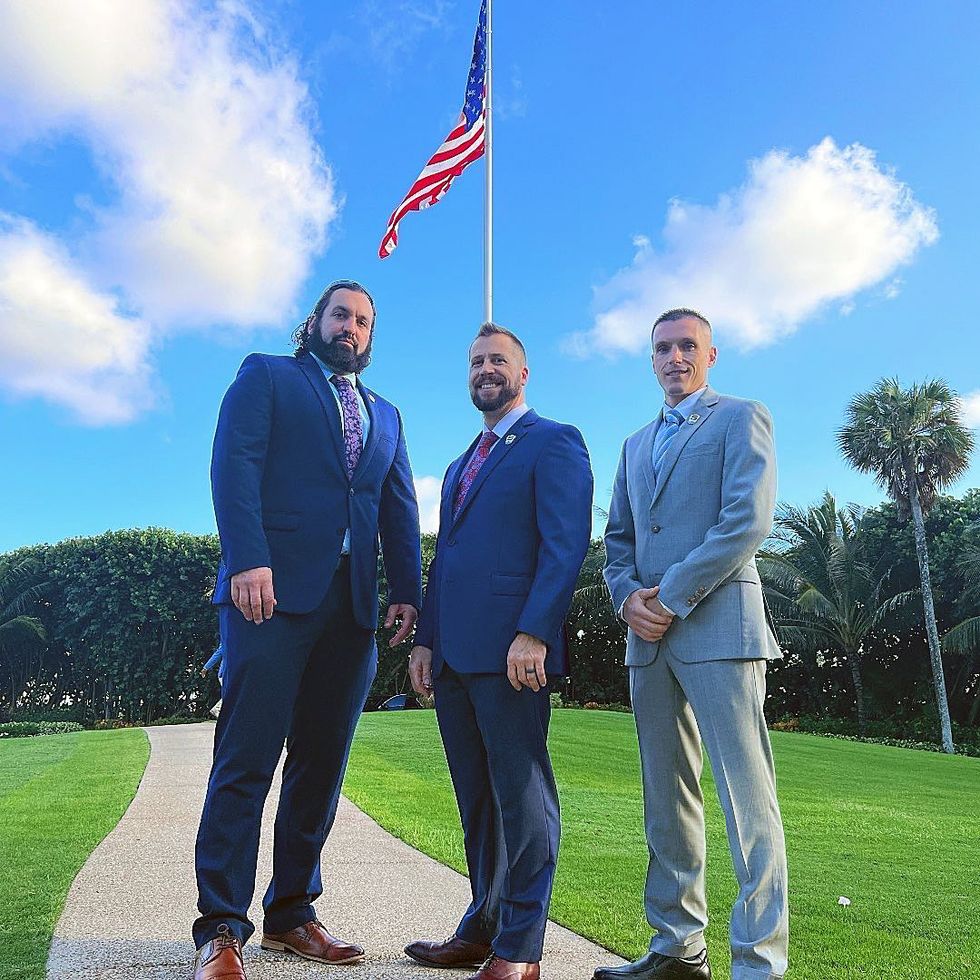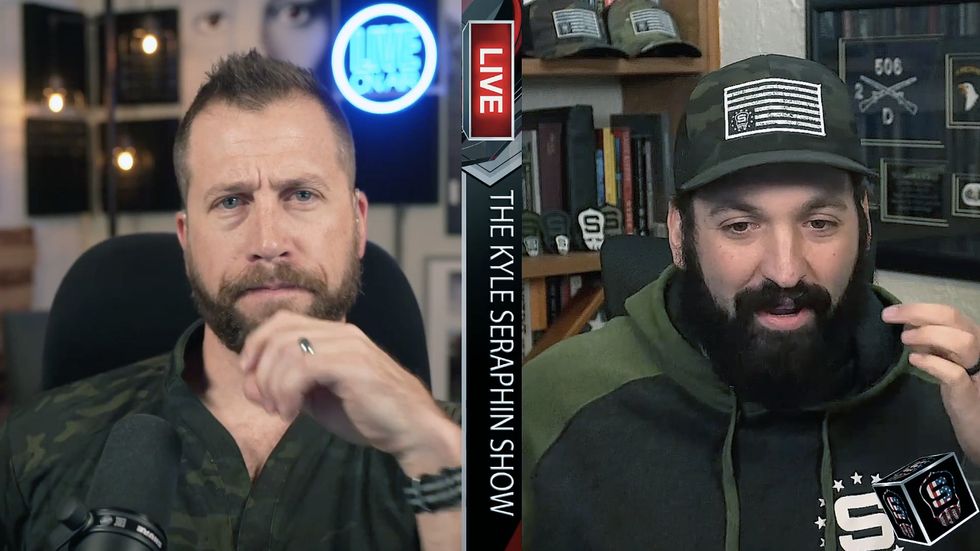
Former FBI Special Agent Kyle Seraphin/Photo by BlazeTV

'I inherited investigations ... into Americans with no allegation of criminality. That was not what I was signing up to do.'
Kyle Seraphin has always been a "bit of a contrarian" — a trait that fueled him as a special agent, pushed him to be a whistleblower, and later put a target on his back courtesy of a weaponized and woke Federal Bureau of Investigation.
"I'm kind of this sort of sarcastic dude," Seraphin, 42, of Williamson County, Texas, said in an extensive interview with Blaze News.
Seraphin finds that sarcasm — and a quick wit — comes in handy.
After battling the bureau over heavy-handed COVID rules and authoritarian vaccine mandates, Seraphin became a protected whistleblower, taking his concerns to Congress. That eventually led to being targeted — set up, really — in a an apparent bureau effort to drive him out.
Seraphin transitioned from his life doing surveillance work for the FBI to broadcasting a daily podcast — "The Kyle Seraphin Show" — covering politics, current events, and yes, the FBI.
"I consider myself a husband and father first and American second, and then distant — whatever job it is now — podcast host. But obviously, former FBI. A recovering FBI agent, so that's part of it."
When he joined the U.S. military, he was 27. Most of his basic-training mates were barely out of high school. "I was the grandpa of the group, if you will, the oldest age you could go through," Seraphin said. "So I've definitely kind of marched to a different drummer most of my life."
When he got out of the service, Seraphin spun through a range of jobs: movie-studio financial analyst at Warner Bros, restaurant manager, paramedic, ad salesman at a CBS affiliate — even selling ergonomic office furniture for a manufacturer from Piscataway, New Jersey.
"I was in the military for just shy of four years," Seraphin said. "Got out of my first enlistment, worked for a hospital. I was a paramedic. I was an air-traffic controller. And I was trying to figure out — I’ve got these skill sets I learned. What am I going to do? And I applied to the FBI."
'That’s the part that has been the hardest for me is to have my livelihood stripped.'
Seraphin joined the bureau in 2016, drawing his first assignment just after the historic presidential election that saw Donald J. Trump defeat Hillary Clinton.
"So one of my first really official duties was walking around in the crowd at Trump's inauguration," he said. "It was also my first interaction with the Secret Service."
CORRUPTION: FBI Knowingly Suspends WRONG Agent for Info Leakyoutu.be
From almost the get-go, Seraphin found his expectations didn't match with what he was assigned to do.
"As I joined the FBI, I was immediately disillusioned in my first assignment that what we were doing was not what I was sold," Seraphin said. "I was told that it was an elite organization. That's not my experience. I was told that it was the best job in the world. And that was also not my experience."
Seraphin's first assignment was in counterintelligence.
"I inherited investigations that were eight years old, into Americans with no allegation of criminality," he said. "That was not what I was signing up to do."

"The reality of counterintelligence investigations in the FBI is that it's very slow," he said. "It's a pace that is meant for seasoned investigators that have a lot of time under their belt that want to kind of take a step back and work slow, long-term investigations."
Seraphin found himself shoulder to shoulder with Secret Service agents at the White House after violent police-brutality protesters got so near to the White House that President Trump was taken to an underground bunker for safety.
"I was on front lines the day after they put him in the bunker," he recalled. "My entire surveillance team drove down in covert vehicles that we had to take the license plates off so that, you know, the Antifa types didn't recognize us. And we stood the line with Secret Service because they ran out of people in the uniformed division."
Seraphin's role as a whistleblower grew out of the 2020 COVID pandemic, when a highly contagious virus drove hundreds of millions of people into self-isolation, followed by a massive government push for a largely untested "vaccine."
Seraphin asked for a religious accommodation to the mandatory vaccine, concerned in part because the shots were developed using cell lines obtained from aborted babies.
In spring of 2022, Seraphin was suspended under the guise of an investigation for doing target practice with his service weapon at a shooting range on federal land in New Mexico. The sound of the shots had apparently prompted calls to local police from a nearby school.
'It appears that there is a political vendetta against your organization.'
The police officer who made contact with Seraphin at the range concluded that Seraphin did nothing wrong. The officer left the scene without taking any action, Seraphin said. The land was often used by the public for target practice.
Even before the unsettling incident in New Mexico, Seraphin had already begun networking with like-minded FBI agents in an online group he set up on the encrypted app Signal. Concern was high over the vaccine mandate. He figured at least 10% of bureau employees felt strongly enough to be conscientious objectors.
One of them turned out to be Special Agent Garret O'Boyle, attached to the FBI's Kansas City field office.
"We'd never worked together. We’d never met in person," Seraphin said. "We simply were part of the same chat group that I was sending out inspirational messages to and letting people know, 'You're not alone.'”
The men discovered that each of them had concerns about the bureau beyond the heavy-handed COVID mandates. They connected on the Signal group and each learned the other was primed to go to Congress with concerns about conditions inside the bureau — including a climate not tolerant of those with conservative views.
"I said, 'Yeah, I'm going to Congress, and I gave them four pages of handwritten notes of what is going on that is wrong in the bureau for the time that I've been there," Seraphin recalled. "And he said, 'I’ve been doing the same thing. I've also been trying to get my member of Congress interested. And I've got some other stuff.'”
Seraphin then did something that O'Boyle would later be blamed for. He contacted the crusading Project Veritas, led by James O'Keefe III. The investigative journalism organization became an FBI target in 2021 after it was provided with the diary of Ashley Biden, the president's daughter. The FBI response included SWAT raids on the homes of O'Keefe and some of his associates.
Seraphin discovered the unique way the bureau was treating the Veritas case. Soon he was doing an interview wearing dark shades and a hoodie from a darkened set with his voice disguised.
"It appears that there is a political vendetta against your organization," he told O'Keefe. "We don't see a lot of investigations into news organizations. That's not common. The ones that are, are almost specifically tied to threat countries that we'd be investigating for intelligence purposes."
"To see a criminal investigation, particularly one categorized as this one, is alerting, and it's surprising based on the public information that is provided," he said.
Seraphin told how the FBI had classified the Veritas investigation as a "SIM," or sensitive investigative matter, and classified in FBI records as related to federal election crimes. Seraphin believed the public — and many within the bureau — would like to know what a news story about the Biden diary had to do with elections.
Based on how the FBI classified the Veritas case, "They're saying that nobody would consider these people journalists, and nobody would consider them news media," Seraphin said. "And I know that to be false, because I'm looking at the document. So I made a decision. This is not the way that our country is supposed to work."
It turned out the methods Project Veritas used to disguise Seraphin's identity were easy pickings for the bureau. It did not take long for the FBI to unmask the voice and determine that Seraphin was the disguised whistleblower.
It would be natural to think that Seraphin would be the target of FBI investigators in the Veritas case, but that's not what happened.
O'Boyle, who had raised objections within his resident FBI agency office about the tactics being used to investigate January 6 cases, would soon be blamed for the "leaks" to Project Veritas.
O'Boyle had just decided to take a new job within the bureau to join an elite new surveillance unit based in Washington, D.C. He and his wife, Heidi, who had just delivered their fourth daughter, sold their home in Wichita, Kansas, shipped their belongings to a new home in Virginia, and thought they were on the way to a new life.
On the day O'Boyle was to start his new assignment, he was ushered into a conference room and told to surrender his FBI credentials and his service weapon. His security clearance was suspended. He was accused of being the Project Veritas leaker.
There was just one problem. He wasn't the leaker. He knew it. Seraphin knew it. And most significantly, the FBI knew it. And yet injustice in the case moved along like a runaway train.
O'Boyle's life suddenly turned upside down. The family's belongings were in storage awaiting the move into their new home. Their approved mortgage was canceled. He and Heidi returned to their native Wisconsin without their belongings — and without O'Boyle's FBI salary.
The O'Boyles were suddenly a homeless family of six. They sought shelter in a camper parked in a relative's driveway, just as the Wisconsin fall tumbled into winter.
“That’s the part that has been the hardest for me is to have my livelihood stripped,” O'Boyle said in 2023. “My ability to take care of my family just taken."
"And, you know, I’m sure people would say this is too extreme, but I don’t think it is. In the modern era, when you take a man’s livelihood away from him, and you tell him he can’t have another one, that’s a death warrant. And you’re going to say, ‘You quit. We’re not going to fire you. You quit.’"
'It’s absurd to me on every level. It defies credulity.'
While Seraphin has left the FBI and pursued his search for the truth in the world of podcasting, O'Boyle is still a suspended special agent without pay, forbidden from seeking or taking work to support his family.
In July 2024, Seraphin went public with the story and his belief that the FBI has opened a grand jury investigation in retaliation for his actions as a whistleblower.
“They went after Garret simply because we were connected together, we were good friends,” Seraphin said. “My belief is they lined it up because they knew we both had gotten into that COVID group that I started on Signal, which had 300 FBI employees.”
Seraphin is determined to see his friend's name cleared and the FBI forced to reinstate O'Boyle with back pay. He cheers on the work done by Empower Oversight, a support organization seeking to get justice for O'Boyle and other whistleblowers.

"What they revealed at Empower Oversight — which is something obviously I've known — is that I did that interview, not Garret," Seraphin said. "Which is a big deal because I know that they suspended my friend. And the other big deal is, is that the FBI knew it wasn't Garret."
Seraphin made headlines for exposing the FBI's interest in investigating the supposed threat presented by parents who went before local school boards to protest COVID lockdowns, the introduction of woke classroom materials, and the fight against placement of explicit homosexual materials in school libraries.
A few weeks after submitting his request for a religious accommodation for the COVID shot, Seraphin was tipped off about the effort to monitor local schools.
"I'm walking through the office, and I get this supervisor who's working intelligence stuff. He's an intel analyst," Seraphin said. "And he said, 'Did you see that email?'" Seraphin had no idea what the supervisor was talking about, but he soon received an email explanation.
"Again, I feel like God's plan is sort of like these crooked lines that make a straight path," he said. "So I got the email, and I opened it up, and I immediately took a walk and made an appointment to go talk to my member of Congress — because the email came from two places: the FBI’s Criminal Division and the FBI’s assistant director of counterterrorism."
'That's a no-brainer for me. That looks like perjury.'
They had plans to introduce a threat tag — "EDU officials" — to track investigations of parents threatening local school officials.
"I knew that [Attorney General] Merrick Garland had just gone in front of Congress, not five days earlier, and said that the FBI would not be using resources to investigate parents at school board meetings, using specifically counterterrorism resources," he said.
"Here we are seeing an email suggesting that the counterterrorism division is involved in this because the AD of counterterrorism signed it," Seraphin said. "That's a no-brainer for me. That looks like perjury."
"My allegation was never that the FBI can investigate parents," he said. "I don't want them to, but they can. I mean, I'm a parent. But there has to be an interstate nexus. There has to be a federal nexus for a federal violation of crime."
Seraphin took another case to Congress — a memo from the Richmond field office that described so-called "radical traditionalist Catholics" as potential terror subjects. It proposed infiltrating Catholic churches as some sort of threat mitigation.
'I'm going home. I'm going back to my father.'
That disclosure led the House Committee on the judiciary to open an investigation and issue a subpoena to FBI Director Christopher Wray. The bureau eventually withdrew the memo after a huge public uproar.
Documents obtained by House investigators showed the FBI "singled out Americans who are pro-life, pro-family, and support the biological basis for sex and gender distinction," according to a December 2023 House report.
Seraphin's post-FBI life has taken him in new directions. He founded the Suspendables, an honor society of current and former FBI employees who are veterans of the weaponized bureau. The group has a website, a logo (an FBI badge turned upside down), and a catalog of merchandise.
He helped to raise hundreds of thousands of dollars to support O'Boyle and Marcus Allen, an FBI analyst who also had his security clearance suspended and was in danger of losing his house. Seraphin is the dean of the Suspendables, using his podcast platform to keep the issues before the public.
He might well have learned the skills for the new role watching his father, Charlie Seraphin, a career radio broadcast journalist and station manager who later transitioned into vice president of marketing for the Texas Rangers and Kansas City Royals.
In 1993, Charlie Seraphin did radio interviews with cult leader David Koresh, the messianic leader of the Branch Davidians in Waco, Texas. As the station manager at KRLD-AM radio in Dallas, he made the difficult decision to air messages from Koresh after the FBI made the request. It led to the release of eight children from the heavily armed building, weeks before an FBI raid and massive fire consumed the grounds.
Charlie Seraphin did a live interview in March 1993 with Koresh, who had been wounded in a firefight with federal authorities. After speaking with the cult leader off the air for 45 minutes, he put him on live, with the FBI's approval.
"I've been shot. I'm bleeding bad," Koresh said. "I'm going home. I'm going back to my father."
The younger Seraphin continues the broadcast tradition of his father with a daily show covering hot-button issues like the FBI raid on former President Donald Trump's Mar-a-Lago compound, the failure of the FBI to arrest the person who planted two pipe bombs in Washington, D.C., on Jan. 6, and the ongoing prosecutions of more than 1,470 Capitol protesters.
The contrarian continues in this new role as an observer and critic.
Noting that more than three and a half years after Jan. 6, the FBI has not made an arrest in the pipe bombs case, Seraphin said: "The fact that they didn't catch the most terroristic person on that day — that will forever live in infamy. It’s absurd to me on every level. It defies credulity."
Seraphin has been a whistleblower, calling attention to abuses inside the agency, but his former employer does not recognize him in that role.
"Democrats have said, 'Your agency has done an investigation and determined that you're not a whistleblower. So we don't recognize you as a whistleblower,'” he said.
"So let me say that in a different way: 'The government has investigated the government and found that the government did nothing wrong.'"
"Take that for whatever that's worth."
In response to a request for comment, the FBI National Press Office told Blaze News: "The FBI does not have any comment."
Like Blaze News? Bypass the censors, sign up for our newsletters, and get stories like this direct to your inbox. Sign up here!
Steve Baker
Contributor